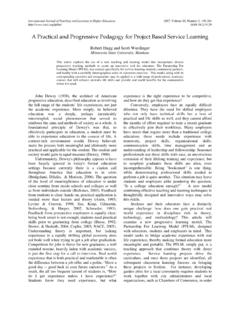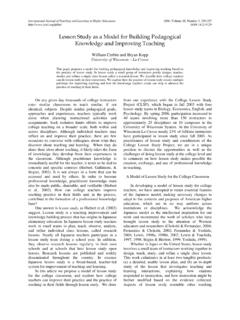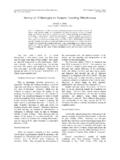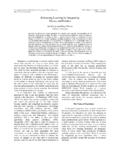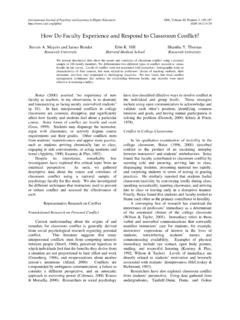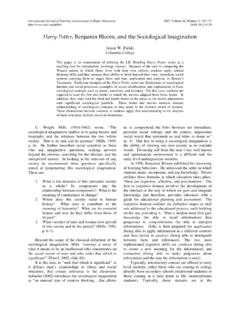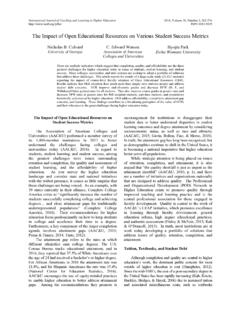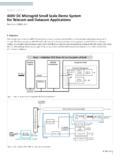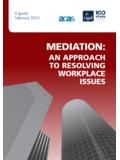Transcription of Valuing Individual Differences Within Learning: …
1 International Journal of Teaching and learning in Higher Education 2005, Volume 17, Number 1, 33-41 ISSN 1812-9129 Valuing Individual Differences Within learning : From Face-to-Face to Online Experience Gordon Joyes University of Nottingham, UK Paul Frize University of Melbourne, Australia The Internet has the potential to connect global communities of learners who share a common interest and yet who have diverse cultural backgrounds and experiences, which shape their current understandings. This paper describes and reflects upon the ways these Individual Differences in experience and understandings are valued and placed at the centre of the student learning experience in an online module of a Professional Doctorate in Teacher Education program.
2 It explores how the online learning experience has been developed to leverage from successful face-to-face implementation and identifies Differences between the two modes, in particular the added value of working online. Issues related to the nature of the support mechanisms necessary for successful online learning are discussed. This development was part of collaboration between the University of Melbourne, Australia where the online technology was developed and the University of Nottingham, United Kingdom, where the course is offered. Parallels between the online collaborative work experiences of the international partner developers and students are highlighted. This paper provides a reflective account of the conversion of a one week residential summer school module, Contexts for Teacher Education, part of a Professional Doctorate (EdD) in Teacher Education, to a collaborative online learning experience which builds upon the Individual Differences cultures, understandings and experiences of the learners.
3 The online learning environment design draws on the past experience of the successful face-to-face course, underpinned by a common set of pedagogical principles for active adult learning . The challenge is to capture in online form some of the nuances of the face-to-face setting, but also to explore and exploit new possibilities offered by the online format. In order to sensitively meet these needs, a flexible online development environment was used to augment standard functions available in the WebCT learning Management System (LMS). The following sets out the background to the online module, the pedagogic rationale and the activities that support online knowledge sharing and generation.
4 The benefits over face-to-face delivery are also explored. Background The EdD in Teacher Education is a research degree course for full and part-time students run since 1998 by a team of lecturers in the School of Education, University of Nottingham. The program consists of taught and research stages centered around comparative studies of teacher education programs. Four core taught modules are studied over a period of two years part-time, broadly providing opportunities to develop student understanding of the main principles and issues underlying teacher education and the global and local research agendas that accompany these. Students are not only introduced to the research skills and methodologies required to complete their research, but are provided with opportunities to further develop and articulate their own research agenda in preparation for the following two year part time research phase, during which they produce a major thesis.
5 The course was originally offered as a mixture of online and summer school residential modules, but in 2003, it was run fully online to widen its accessibility. Students are mainly in mid-career with a wide range of professional and family responsibilities; they are quite capable of organizing their lives to work at this level if the cost and the requirement for visits to the UK were removed. As the final research phase of their course would require fieldwork in their own countries, ways of supporting this at a distance made more sense than requiring visits to the UK. There are currently 14 students studying online, in Hong Kong, Canada, China, Cyprus, Greece, Cayman Islands, Jamaica, Poland, and the UK.
6 The challenges for Course Design Professional doctorates set a particular context for learning contrasting with regular undergraduate education. They generally attract participants who view their own personal development and academic ambition as fully integrated with their professional development and have a commitment to furthering their profession (Bourner, Bowden, & Laing, 2001). [It is] important that higher education accepts the responsibility for producing the critical thinking and critical thinkers that will seek to surpass and transform current conceptions and practice in [their] professions. (Bourner et al, 2001 ) Joyes and Fritze Valuing Individual Differences Within learning 34 TABLE 1 Course Design challenges in Terms of Student Starting Position and Course Expectation Course Expectations Student Starting Position The need for constructivist pedagogies that support engagement with critical thinking and understanding.
7 A possible pedagogic preference for a transmission mode of learning , but this will vary. The need to work in a variety of online modes, for example, Individual research and collaborative problem solving. Varying expertise in learning online. The need for the doctoral research to be informed by and inform the global agenda in teacher education. A familiarity with local issues and an interest in pursuing research around a local problem in order to improve local practice. The need to develop analytic and theoretical interpretations of data. A tendency towards description rather than analysis, but this will vary. The need for constructivist pedagogies that support engagement with critical thinking and understanding. A possible pedagogic preference for a transmission mode of learning , but this will vary.
8 There are, however, important Differences in the starting points of Individual EdD students and such expectations. The ways these have been interpreted for the course is summarized in Table 1. This gap presents a challenge to be able to accommodate variation between students backgrounds, needs and expectations, while harnessing the opportunities provided by such real-life Differences as the foundations for an engaging, multi-perspective learning experience involving adult learners. Requirements for a Rich Environment for Active learning (REAL) for Adults Notions of adult learning (Knowles, 1990) and Grabinger and Dunlap s (2000) Rich Environments for Active learning (REAL) have informed the design of both face-to-face and online learning modes.
9 Table 2 outlines REAL pedagogic principles and the ways these have been incorporated into the Contexts for Teacher Education module in the EdD in Teacher Education course. A key feature of a REAL is that not only are there opportunities for knowledge creation, but that these are situated Within authentic interactions. This authenticity is shaped Within the module described in this paper by using an activity that generates new knowledge that is directly relevant to the students Individual studies/interests and utilizes appropriate higher order and research relevant thinking skills. These learners genuinely hold expert knowledge that will be new to the others studying the module. It is the deliberate use of this situation that aims to establish a notion of the need to belong to and participate Within the group, and to ensure students feel part of a professional community (Wenger, 1998).
10 From Mixed-Mode to Online Delivery The Contexts for Teacher Education module, originally piloted as a one-week summer school class, required students to develop, apply and revise a framework for the analysis of any given Teacher Education programme. Figure 1 outlines the module activities and their alignment with the pedagogic principles of Table 2. In the face-to-face setting, various forms of interactive group activity and classroom discussion provided rich opportunities for social construction of knowledge, generative learning and sharing of diverse real life experiences. Students reacted very positively to this part of the module. The notion was to celebrate their diverse perspectives, to encourage them to consider some different perspectives through wider reading, and then through small group work, peer review and a classroom negotiation process carefully nurtured by the tutors, arrive at a consensus on a workable framework for analysis, which could be used on case studies and further revised.
